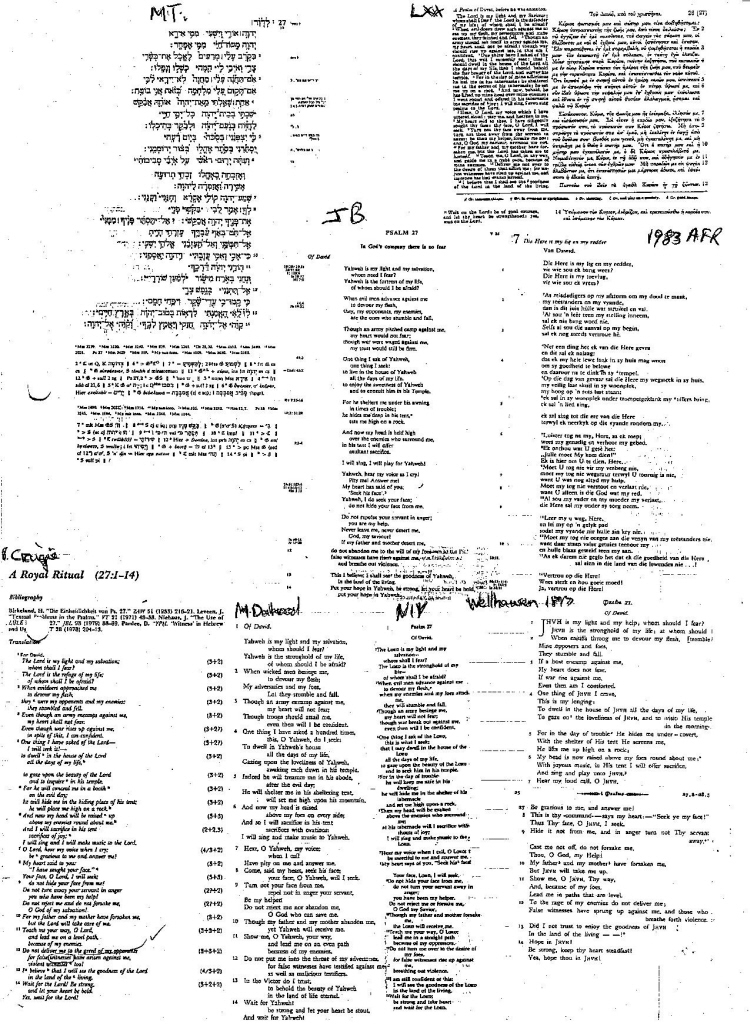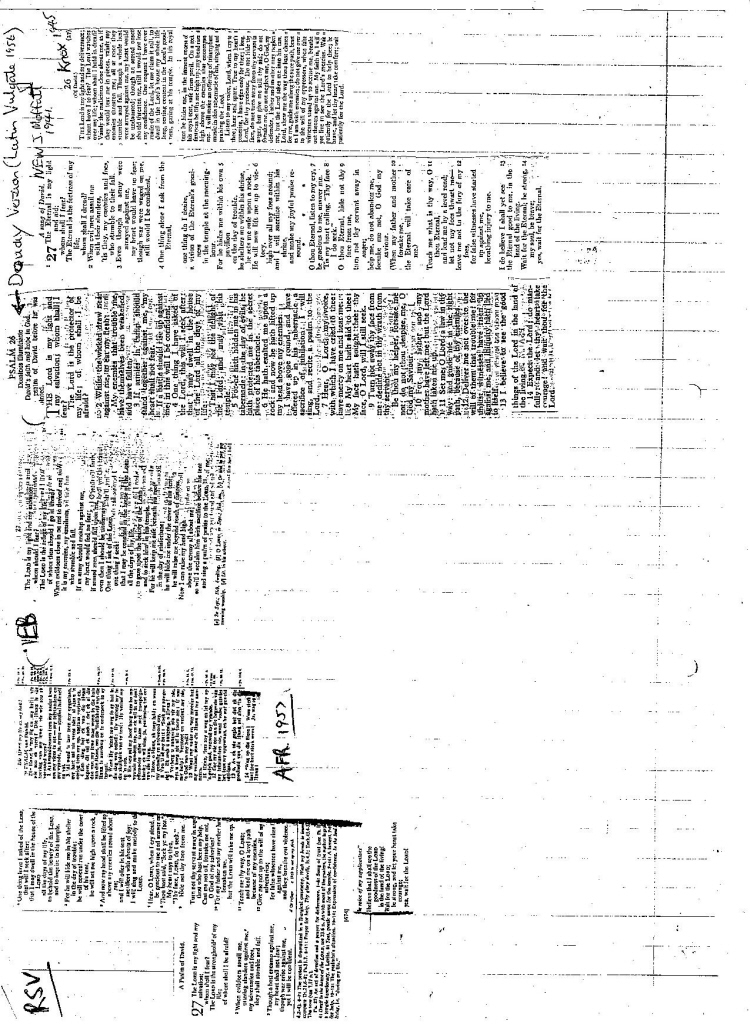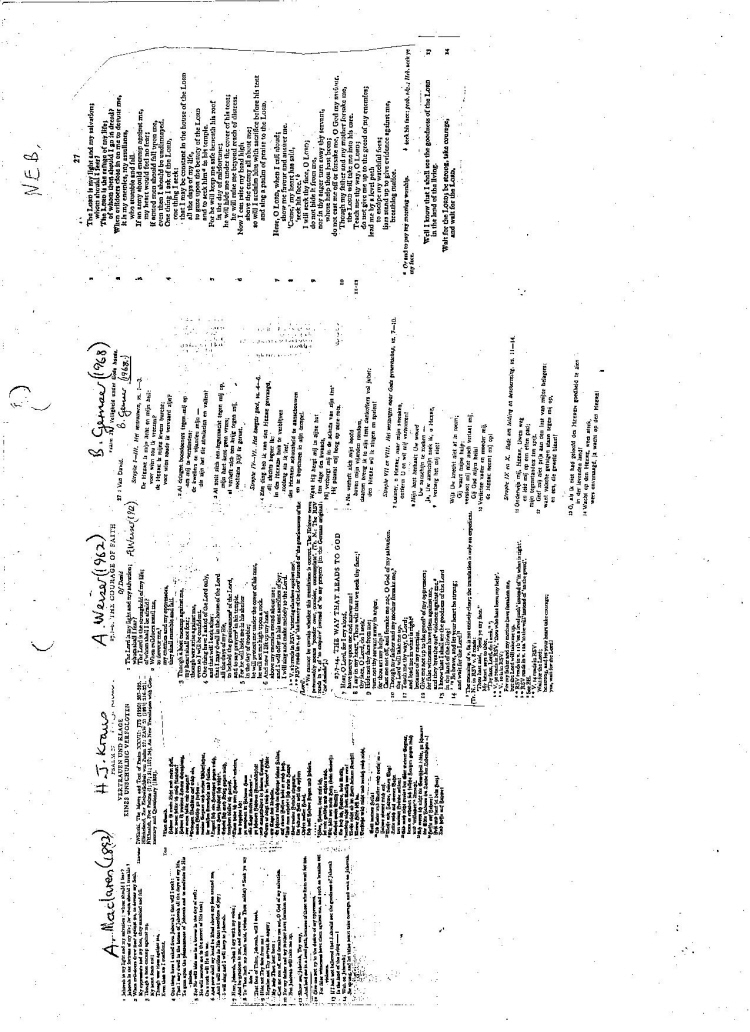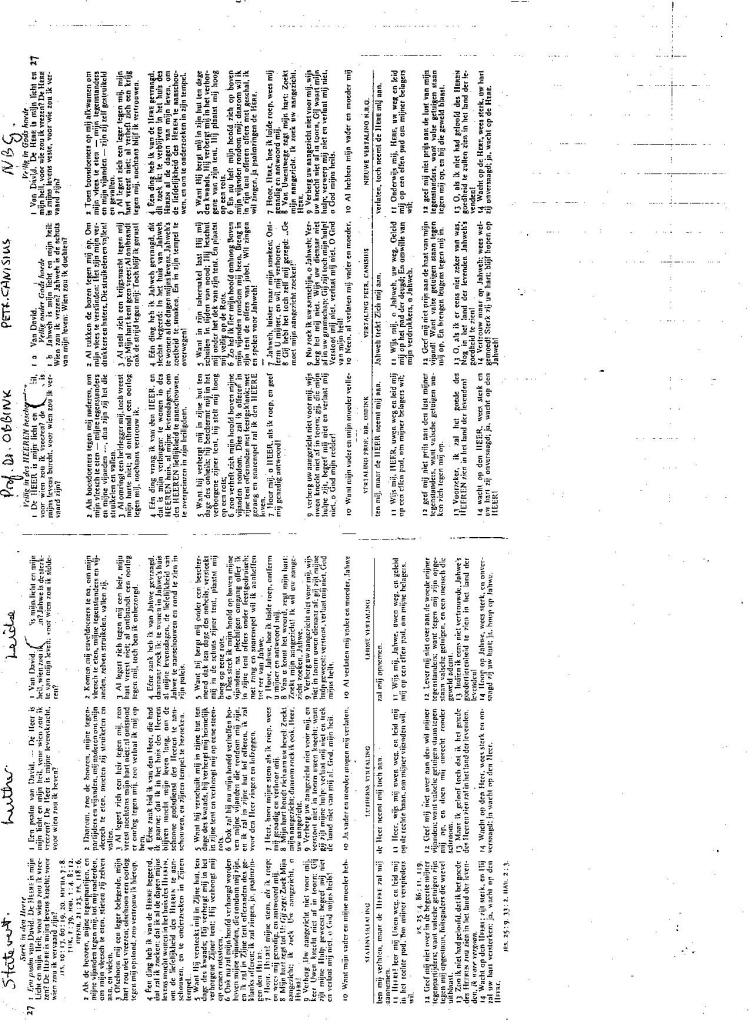Psalm 27 using multi-translations
by koot van wyk (DLitt et Phil; ThD)
Kyungbook National University
Sangju Campus
South Korea
conjoint lecturer of Avondale College
Australia
4 January 2010
The Hebrew consonantal text of the Masoretic tradition is the very Words of David and the very Word of God. They are found in a late document dating to 1008 CE but when one compares this document with the transmission accuracy of Daniel at Qumran, (see 4QDana) then one is surprised to find a 99.9% accuracy rate. This means that other books of the Masoretic Text is also reliable and thus the preservation of the Word of God was very careful for millennia. All other ancient translations like Greek (in all its forms including the so-called LXX), Coptic, Syriac, Old Latin, Vulgate, Armenian, Arabic, Ethiopian are all later derivates and texts with inner translation and transmission problems. They are secondary witnesses to the Word of God but not the exact Word of God. On a same level as these ancient secondary witnesses are the modern contemporary translations, although the degree of literalness in corresponding with the primary source, will place these contemporary translations either closer or further down the ladder of the secondary sources. The NIV for example will be more literal than the NEB and the KJV was intended to be very literal. Calvin's translation is more literal than Luther and both are better than the so-called LXX which is nothing but a byzantine dating tradition in form, since a transformation took place of its form since it was originally written in 287 BCE in Alexandria.
So faith starts and ends with a very literal translation of the Hebrew which is the original Word of God for the Old Testament.
We want to focus on Psalm 27 in this writing and more than 20 translations will be used to look at the psalm. The so-called byzantine LXX, Syriac and the Vulgate are the only ancient secondary witnesses that we will be using. All the other texts are contemporary texts that we will be using. Some are from the Reformation era like Luther, Knox, Dutch Staten Vertaling, Leidse Vertaling, the translation of prof. dr. Obbink, the translation of Petrus Canisius, but Enlightenment scholars like Julius Wellhausen's translation of 1897, A. Maclaren of 1893, H. J. Kraus, A. Weiser of 1962, B. Gemser of 1968, the RSV, the Old Afrikaans translation of 1957, the New Moffatt translation of 1941, the Jerusalem Bible, M. Dahood, NIV, Peter Craigie, New Afrikaans vertaling of 1983 are all available to us for comparison here.
Text translated by Van Wyk 2010 literally from the consonantal text of the Masoretic tradition (Hebrew)
Psalm 27
1a The Lord is my light and my salvation.
1b From who shall I fear?
1c The Lord is the stronghold of my life.
1d From who shall I be afraid?
2a In the approaching over me from evil doers
2b to eat my flesh
2c (my adversaries and my foes to me)
2d they stumble and fall.
3a If an army encamp against me
3b not shall my heart fear.
3c If war arises over me
3d In that I will be confident.
4a One thing I ask from the Lord
4b I will seek it (Craigie)
4c I may dwell in the house of the Lord
4d all the days of my life.
4e to gaze in the loveliness of the Lord
4f and to the morning His temple
5a For He will hide me in a booth
5b on the day of evil.
5c He will hide me in the shelter of His tent
5d upon a rock He will raise me high.
6a And now, my head is raised up
6b over my enemy that surrounds me.
6c and I will sacrifice in His tent
6d sacrifices of joy.
6e I will sing and I will make music to the Lord.
7a Hear my voice O Lord, I will call
7b and pity me and answer me.
8a To you my heart speaks
8b they seek my face.
8c Your face, O Lord, will I seek.
9a Do not hide Your face from me.
9b Do not cast in anger Your servant
9c my help are You.
9d Do not reject me and do not abandon me
9e my God saving me.
10a When my father and my mother forsake me
10b and the Lord will collect me.
11a Show me, O Lord, Your way
11b and lead me in the path that is level.
12a Do not put me in the soul of my adversaries
12b for false witnesses stand on me.
12c and one that breathes violence (Gemser 1968)
13a Did I not believe, to see
13b in the goodness of the Lord
13c in the land of the living.
14a Wait unto the Lord.
14b Be strong and keep steadfast your heart,
14c and wait unto the Lord.
van wyk notes to Psalm 27
The RSV sees the psalm as an act of devotion and a prayer for deliverance. The 1957 Afrikaans translation sees it as The Lord is my Light and my Salvation. The Old Dutch Staten-translation had strong in the Lord. The New Dutch Bible reads Safe in God's keeping and the Jerusalem Bible reads In God's company there is no fear.
Traditionally, the Psalm is divided into two sections:
verses 27:1-6 Trust in the Lord
verses 27:7-13 A Cry for Help.
The two-fold division can be seen in the section heading of the different translations. However, clustering the sentences together by using the example of F. I. Andersen for sentence identification, actually led this researcher to see that the Psalm is divided into three sections:
verses 27:1-3 Trust in the Lord
verses 27:4-6 Liturgical desires
verses 27:7-13 Petition for help
27:1
From who shall I fear? This question is repeated three times, in verse 1b, 1d and in verse 3b. It expects the answer: No one. While the Common Language version of the Today's English Version translated it with a direct statement, all the versions mentioned above kept it as a rhetorical question: RSV, JB, NEB, Old Afrikaans and the New Afrikaans version.
27:2
evil doers: The RSV combines three Hebrew words Evil doers . . . adversaries and foes, all referring to the same group of men. So also in the NIV; New Afrikaans and Old Afrikaans.
The NEV separate the group of men so that two groups are thought of here: a) evil doers and b) the enemies, assailants. So also the JB, Douay Version (Latin Vulgate of 1956).
The difference between these two major groups of translations is due to syntactical considerations. The one group see: A comes against me = my A whereas the other group of translations see: A comes against me (not =) my A thus, it becomes for them: A1 comes against me and that is not the same as my A2.
In the above translation it is seen as equivalent terms and their difference do not rest on textual critical considerations.
in the approaching over me from evil doers to eat my flesh:
We have kept here very close to the literal translation of the Hebrew. The sentence is loaded with particles that the translations skipped over or left out. The difficult reading that we propose here is better in our thinking since it indicates that the evil doers are not drawing near him but are in fact already near and over him.
Most translations wanted to change the preposition b at the beginning of the sentence into a temporal function when. This was done by Dahood (pan-Ugaritic translator), Wellhaussen (higher critical designer and Arabist), Craigie, Weiser (also a higher-critical methodology user of 1962) and Mclaren in 1893. The so-called byzantine LXX is using a phrase that is keeping close to the literal rendering of the Hebrew but the translation of the modern scholars is again jumping back on the temporal function of the locative form. This means that a locative preposition is translated by them to function as a temporal meaning. Instead of reading in, they want to read when.
Eat my flesh means to kill me but the RSV made it more figurative by using slander. We feel that instead of a mere emotional, inner attack it refers here to a strong physical danger. The basis of the differences here is thus semantical.
We will paraphrase the verse as follows, respecting all the syntactical elements used by the original poet:
2a In [the event of] the approaching over me from evil doers
2b [in order] to eat my flesh
2c ([that means to say:] my adversaries and my foes [related] to me),
2d [the result is:] they stumble and fall.
We will
not shall my heart fear:
The future tense is used also by the RSV, Afrikaans, Weiser, NIV, Dahood, Craigie, so-called Septuagint. On the other hand, the following translations rendered it in the present tense: Wellhausen (1897); Gemser (1968); H. J. Kraus; A. Maclaren (1893).
Some translations interpreted this phrase holistic as an idiom referring to the whole person, not just a part of him. Thus, the New Afrikaans version interpreted it and translated will not become afraid. An emotional interpretation was made by the NEB which rendered my heart would feel no fear.
An intellectual interpretation was done by Gemser (1968) when he rendered my heart knows no fear. We say it is intellectual since the heart is able to be involved in the function of knowledge, thus Gemser.
The New Afrikaans translated method is done with the consideration that a descriptive phrase or better-known synonyms should replace the idiomatic expression of the Ancient Near East.
if war arises over me:
In verse 3c it is translated as if war arises against me by the RSV, Old Afrikaans translation, P. Craigie, Wellhausen (1897). We also chose this translation since milhamah is more likely to be war.
Some translators tried to convert the literal into a metaphor for something more direct, for example the TEV rendering if the attack would start on me.
In that I will be confident
In verse 3d we translated as such and P. Craigie are the closest to us with in spite of this I am confident. We argue that one has to be very literal as possible. Where Craigie got the reading from in spite, is hard to say. It is a baggage that he carried in from his interpretation of the context. It is paraphrasing the text, and he may be right but for a literal rendering ideal, one may refrain from such rendering and put it in [ ]. This means that it is extra elements that one translate in order to make it more meaningful. The literal translation of the Latin Douay (Vulgate 1956) is similar to what we consider to be proper for this phrase, in this will I be confident. The preposition b in this phrase is translated differently by translations: in by the so-called LXX and also Craigie. However, Wellhausen (1897) translated it as even then, so also the NIV, Dahood, Old Afrikaans translation, A. Maclaren (1893), A. Weiser, B. Gemser, New Dutch Bible. The RSV translated the preposition with yet and so also the Leidse (Dutch); Petrus Canisius (Dutch) and H. J. Kraus translated it as still and so also the Jerusalem Bible, New Afrikaans, New J. Moffatt (1941) and Knox (1945).
The consideration that led to the difference in translations of the b is syntactical.
I will seek it
Craigie's rendering is possibly the closest to the original here. It is different than that of B. Gemser, H. J. Kraus, Petrus Canisius (Dutch), prof. dr. Obbink (Dutch) and also Luther, which translated it as this only I desire. Our problem is this, where did Luther and the others see the only? The element only was supposed to be in brackets [ ]. The translation of the New J. Moffatt (1941) as this is my longing is not exactly what is in the form of the text.
to gaze in the loveliness of the Lord
The context makes it clear that the Lord's goodness is in focus here in 4e. The Latin Vulgate of the Douay translated to look at. The Old Afrikaans give it as to gaze upon. This is also the reading by Craigie, Dahood, Wellhausen, RSV, so-called LXX, B. Gemser, A. Weiser, and A. Maclaren. The preposition b is used and the very direct rendering will be in. If the writer of the poem wanted to express upon, it is more likely that he would use `l as preposition. He did in 3a and 3c. So why would there be a functional sharing suddenly in this verse? For that reason, we will not render upon. Of course, the logical question is: how do you gaze in the loveliness of the Lord? How do you gaze in?
God's goodness surrounds the human being so that there is no direction he can look without seeing His goodness. To look into the mist means that the mist surrounds the person. In similar vein does the believer look or gaze in the loveliness of the Lord that surrounds the believer.
The various translations brought out different semantic considerations here due to the cultural-religious setting that they have placed the Psalm in: to enjoy (Jerusalem Bible). Three possibilities are given: a. mere looking b. involved looking or contemplation c. view to experience. Our understanding is that the best option is either b or c.
loveliness
We need to point out that this word appeared a few times in the inscription KAI 26 which is a Canaanite Inscription brought together by H. Donner. The meaning in this inscription is grace, favor, kindness, or goodness.
The word were viewed differently by different translations. RSV beauty and also Wellhausen, Dahood, Craigie, the so-called LXX, NIV. A number of translations translated sweetness and so also the Latin Vulgate (Douay) and B. Gemser. For them it was a depersonalized quality of the appearance of the Lord. Other translations wanted to make it a depersonalized quality of the actions of the Lord and so A. Weiser translated it as graciousness, H. Kraus as friendliness and A. Maclaren as pleasantness. A case of a personalized quality of the actions of the Lord is the New Afrikaans translation: to experience his goodness. A case of the personalized quality of the appearance of the Lord is the Jerusalem Bible with to enjoy the sweetness.
One must always be careful of translations that wants to personalize a construction that is in the Hebrew actually depersonalized or vice versa. Or when the nominal construction is verbalized by the translation. In so doing, some original force or energy is removed from the element.
and to the morning His temple
What verse 4f is saying here is that the believer will gaze in the loviness of the Lord and also gaze to the morning His temple. He will gaze until it is morning at the temple of the Lord. It appears that the person will spent the whole night praying, looking at the Temple. When Christ went into Gethsemane, He was able to see the temple wall in the shadows of the night, with or without the moon shining. The meaning of gazing to the temple is not just a liturgical act but because the Lord is there. The direction is to the temple since that is where the writer expects the Lord to be.
A variety of translations were given for the words to the morning.
inquire: RSV, Old Afrikaans, Craigie
meditate: A. Maclaren, B. Gemser, New Afrikaans
say prayers: A. Weiser
seek: NEB, NIV
visit: Douay (Vulgate), Wellhausen, Luther
consult: JB
awaking each dawn: Dahood
survey: so-called LXX, New Dutch Bible, Leidse, Staten translation (Dutch)
consider: Petrus Conisius (Dutch)
at the morning hour J. Moffatt
bestow delight Koehler and Baumgartner Dictionary
5a For He will hide me in a booth
5b on the day of evil.
5c He will hide me in the shelter of His tent
Arriving at the temple and gazing upon the loviness of the Lord, His grace for salvation of the believer, the whole night contemplating on the loviness of that grace, then in the morning atonement against evil of Satan is secured. Evil will not be effective against this believer since God will hide the believer in a booth on the day of evil. The context seems to be salvation and not military here. The day of evil is then not a destruction by military events but by a spiritual attack by Satan and his forces. It is at the tent of the sanctuary of the Lord that atonement takes place. On the Day of Atonement the evil one wants to claim the believer and his life but the protective shelter is provided for the believer by God Himself, so that the believer is hidden by Him. God Himself solves the problem as verses 5a-5c is indicating. For this researcher it seems as if the reference is here to the tent sanctuary that was in use during the wilderness wanderings. For the so-called LXX both the booth and tent is His tabernacle.
day of evil
Two forms are available by translations on the word day, time and day. The Jerusalem Bible has time. Two forms are also available for evil by translations: evil (Craigie, Dahood, B. Gemser, A. Maclaren, H. J. Kraus) but trouble (NIV, Wellhausen, New Afrikaans, so-called LXX, A. Weiser).
Instead of moral evil, some translations prefer to refer to daily difficulties.
in a booth
The Hebrew text of the consonantal Masoretic text reads no masculine 3rd person suffix to the noun. It is a booth and that is how Craigie, Wellhausen also read it. Most translations translated it as His booth (RSV, NEB, New Afrikaans, Old Afrikaans, Douay, JB, so-called LXX, Dahood). There are semantic differences for the word booth: abode (Dahood); dwelling (NIV), covert (Wellhausen), house (New Afrikaans), awning (Jerusalem Bible), Tabernacle (so-called LXX), shelter (B. Gemser and A. Weiser).
5d upon a rock He will raise me high.
6a And now, my head is raised up
The result of salvation is a firm foundation for the believer. It is a blessed result. It is a victory over evil accomplished by God. The actions are done by God Himself and He raises the believer's head. All takes place around the temple, sanctuary, tent and the booth of God's protection. There is shelter for the sinner against Satan's accusations and claims of ownership.
In Genesis 3:15 Satan is said that he will bite Christ in the heel but that Christ will crush His head. In salvation, Christ is the One who raises the head of the believer high (verse 6a).
What the translators did in the New Afrikaans translation is to ignore the sentence order and so they have rearranged the sentences so that some are interchanged. The waw's are removed from the sentences. What is plaed into the foreground is the actions of sacrifice and singing while in the original as with the other translations the raising of the head is in the foreground.
6a And now, my head is raised up
6b over my enemy that surrounds me.
6c and I will sacrifice in His tent
6d sacrifices of joy.
As a result of the grace of God that lifted the head of the sinner who is now a believer, the head is over the enemy that surrounds him. The greatest enemy of the believer is Satan and his angels. But, the result of salvation is victory over Satan. As a result of this salvation the believer in the poem wants to sacrifice in His tabernacle.
6d sacrifices of joy.
6e I will sing and I will make music to the Lord.
Joy is expressed with sacrifices accompanied with singing and making music to the Lord.
7a Hear my voice O Lord, I will call
This is the translation of Dahood. The only difference is that the period is placed in a co-ordinate sequence. Craigie, NIV translated it as when I call. There is no temporal particle here in the original. Craigie should have placed the word when between brackets [ ].
The tendency by translators is thus to cancel apostrophe out. In our translation we have retained the apostrophe.
7a-12c
Between verses 7a-12c we have a prayer of the believer. It is natural that the believer will have regularly a prayer to His God for continuous support and help.
13a Did I not believe, to see
13b in the goodness of the Lord
13c in the land of the living.
Only the believer can see in the goodness of the Lord and can see in the land of the living. The land of the living are those who have eternal life. It is thus the vertical dimension in one's life. Through belief in God and His salvation, the believer believe and is supported.
14a-14c
14a Wait unto the Lord.
14b Be strong and keep steadfast your heart,
14c and wait unto the Lord.
When we come to the end of the poem, the believer who was rescued by God, who wanted to thank Him, prayed to Him, find security of belief (13a-13c) and now in 14a-14c is testifying about his faith. He has a message for others that they need to wait unto the Lord. The way to wait unto the Lord is to be strong and steadfast in one's heart.
Adventists are those who wait upon the Second Coming of the Lord. They need to be strong and steadfast. If one looks at the last verse of Daniel 12 then the ones' waiting is counted blessed. This is a waiting upon the Advent (Second).
Content summary
The Psalm is a description of the process of salvation. The poet is more concerned about his relationship to the Lord in a salvation context than about military enemies. The solution for his problem as sinful believer is to approach the temple or sanctuary of the Lord since that is where atonement takes place. Only through the process of the Sanctuary Message as explicated in the New Testament in the book of Hebrews can the believer find atonement and a solution to his sin-problem. He did and God forgave him and thus he wants to go again to the sanctuary to obtain support for his believing life. As a believer he keeps praying to the Lord and that is done in verses 13a-13c and in the last part he witness for the Lord to others, that the key in life is to wait upon the Lord.




















